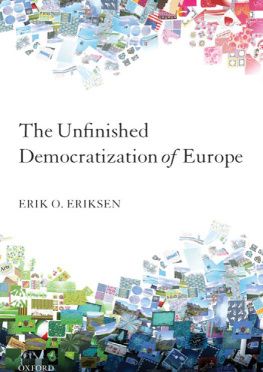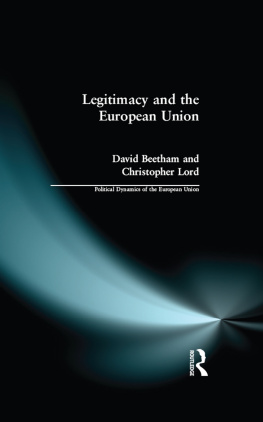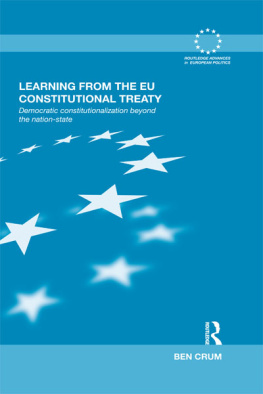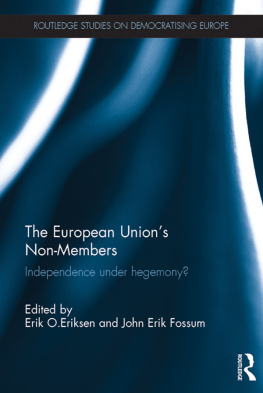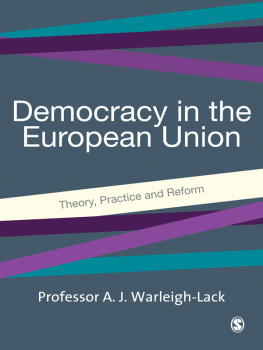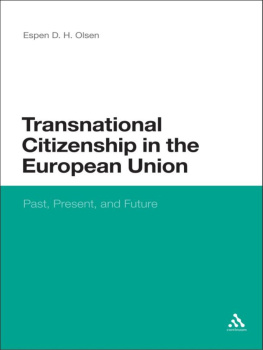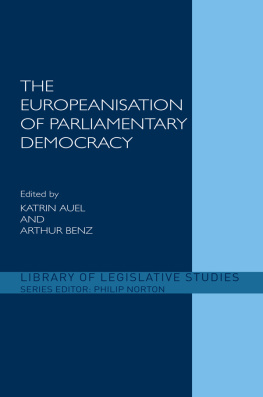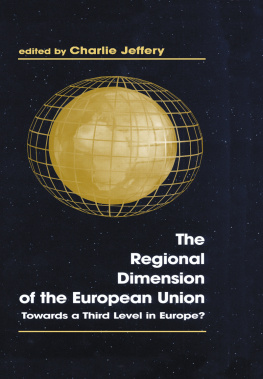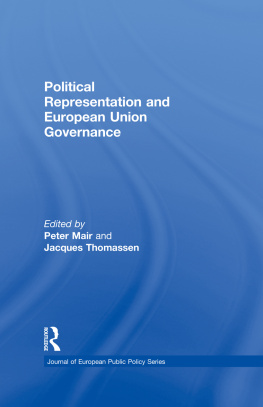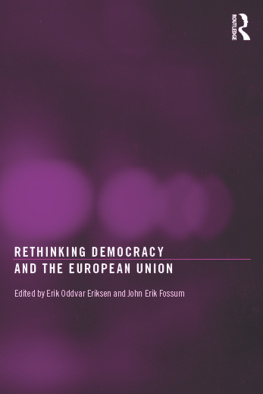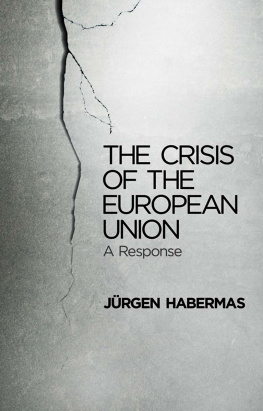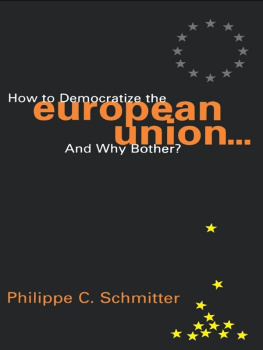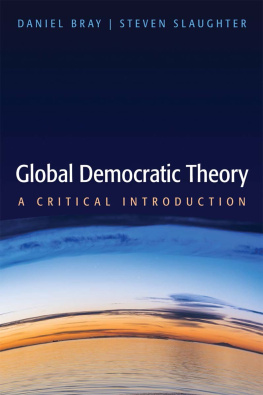
T H E U N F I N I S H E D D E M O C R AT I Z AT I O N
O F E U RO P E
This page intentionally left blank
The Unfinished
Democratization
of Europe
E R I K O. E R I K S E N
Great
Clarendon Street, Oxford ox2 6dp
Oxford University Press is a department of the University of Oxford.
It furthers the Universitys objective of excellence in research, scholarship, and education by publishing worldwide in
Oxford New York
Auckland Cape Town Dar es Salaam Hong Kong Karachi
Kuala Lumpur Madrid Melbourne Mexico City Nairobi
New Delhi Shanghai Taipei Toronto
With offices in
Argentina Austria Brazil Chile Czech Republic France Greece Guatemala Hungary Italy Japan Poland Portugal Singapore South Korea Switzerland Thailand Turkey Ukraine Vietnam Oxford is a registered trade mark of Oxford University Press in the UK and in certain other countries
Published in the United States
by Oxford University Press Inc., New York
# Erik O. Eriksen 2009
The moral rights of the author have been asserted
Database right Oxford University Press (maker)
First published 2009
All rights reserved. No part of this publication may be reproduced, stored in a retrieval system, or transmitted, in any form or by any means, without the prior permission in writing of Oxford University Press, or as expressly permitted by law, or under terms agreed with the appropriate reprographics rights organization. Enquiries concerning reproduction outside the scope of the above should be sent to the Rights Department, Oxford University Press, at the address above
You must not circulate this book in any other binding or cover and you must impose the same condition on any acquirer British Library Cataloguing in Publication Data
Data available
Library of Congress Cataloging in Publication Data
Library of Congress Control Number: 2009934136
Typeset by SPI Publisher Services, Pondicherry, India Printed in Great Britain
on acid-free paper by
the MPG Books Group
ISBN 9780199572519
1 3 5 7 9 10 8 6 4 2
For Andreas, Hakon, Henriette, and August
This page intentionally left blank
Preface and Acknowledgements
This book has had a long journey. It started in 2002 when we initiated the project Citizenship and Democratic Legitimacy in the European Union (CIDEL) and was carried on with the instituting of the RECON project in 2007.1 It is the result of several years of work to come to grips with the fact that a new political order has arisen in Europe, and one which has transformed the Westphalian order. For the first time in human history, we witness the development of a political order that is not based on a culturally homogenized people, or brought about by coercion and brute force. The nature of the European Union is a large and contentious issue, but nevertheless it is one which has brought to the fore the question of whether post-national democracy is possible. Are we now witnessing the third transformation of democracyto a post-national formsucceeding the transformations to the city-state and to the nation state? Alas, the resources for such a move are shallow at the European level and it is the member states that hold the means of legitimate violence in reserve. The European Union (EU) is a polity that does not itself have direct control of a given territory; it lacks a collective identity; truly hierarchical principles of law and powerful enforcement means.
In order to know what is to be democratized one needs a grip on the nature of the beast. But what does it entail to talk of democracy at the European level? Does it imply establishing democratic institutions like the ones of the nation state? Does it presuppose a European people, a nation or something less? Can there be constitutions without a state and can there be democracy without it? The question is, in other words, whether democracy really can be disassociated from its hierarchical, nation-state foundation. To clarify such questions requires the joint effort of many disciplines, as normative, legal, and socio-political aspects are interwoven.
Fortunately this has been much of a collaborative work and I have benefited greatly from discussions, collaboration, and co-writing. I am grateful for all that I have learnt from my colleagues at ARENA over the years and the networks I have been taking part in. In particular, I am indebted to John Erik Fossum, with whom I have cooperated for years, and who generously allowed me to reprint a co-authored article (Chapter 4). I am grateful to Agust Jose Menedez who urged me to take European law seriously, and to Helene Sjursen who made me aware of the importance of the EUs external dimension.
I am grateful to publishers for permission to reprint material from the following: Chapter 3: Deliberation und demokratische Legitimitat in der EUZwischen Konsens und Kompromiss, in Benjamin Herborth and Peter Niesen (eds), Anarchie der kommunikativen Freiheit: Jurgen Habermas und die Theorie der internationalen Politik, (Frankfurt am Main: Surhkamp, 2007).
1 On the CIDEL project, see > on Reconstituting Democra cy in Europe (RECON), see (both accessed 23 March 2009).
viii
The Unfinished Democratization of Europe
Chapter 4: Europe in Search of Legitimacy: Strategies of Legitimation Assessed, International Political Science Review, 25/4 (2004): 43559.
Chapter 5: Why a Charter of Fundamental Human Rights in the EU?, Ratio Juris, 1/3 (2003): 35273.
Chapter 6: The EUA Cosmopolitan Polity? Journal of European Public Policy, 1/2 (2006): 25269.
Chapter 7: An Emerging European Public Sphere, European Journal of Social Theory, 8/3 (2005): 34163.
Parts of this book have been presented in seminars and conferences, in Oslo, Florence, London, Frankfurt, Chicago, Copenhagen, Stockholm, Madrid, Aalborg, Austin, Berlin, Montreal, and Riga. A number of people have commented on specific topics raised in this book, among them are Lars Blichner, James Bohman, Hauke Brunkhorst, Damian Chalmers, Nicole Deitelhoff, Rainer Forst, Harald Grimen, Daniel Gaus, Jurgen Habermas, Kerstin Jacobsson, Christian Joerges, Knud Erik Jrgensen, Marika Lerch, Anders Molander, Jurgen Neyer, Johan P. Olsen, Ulrich K. Preuss, Kolja Raube, Thomas Saretzki, Rainer Schmalz-Bruns, Philip Schlesinger, Anne Elizabeth Stie, Hans-Jorg Trenz, anonymous reviewers for Oxford University Press, and Philippe C. Schmitter and Christopher Lord, who commented critically on the penultimate version of the manuscript. The comments I have received are immensely valuable although I am not sure to what degree I have managed to satisfy my critical interlocutors.
In writing this book I have profited greatly from ARENA, which provides resources also in the form of a stimulating research community. I would also like to thank the Norwegian Research Council for financial support. I benefited from being visiting professor at the London School of Economics and Political Science winter/spring 2006. For superb technical as well as research assistance I would like to thank Erik Ryen and Marit Eldholm. Without them, Geir Kvrk and the rest of the administrative staff at ARENA this work would not have been possible. I am also grateful to Dominic Byatt for excellent backup. In particular I am grateful to Helene for her persisting support at critical junctures of this book project and for her continuous encouragements.
Contents
3.1 Typology of agreements
4.1 Integration on the basis of problem solving
4.2 Value based integration
4.3 Rights based integration
4.1 Three logics of integration
7.1 Typology of public spheres
Next page
